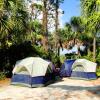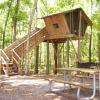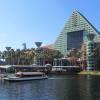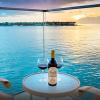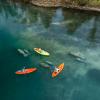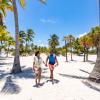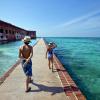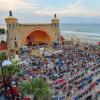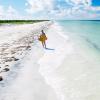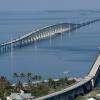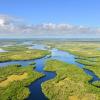FLORIDA CAMPING
CAMPING SCENES FOR EVERYONE
Camping in Florida can be seaside, at springs or in the woods.
Florida Camping History
Paleo-Indians were camping in Florida 12,000 years ago, native Timucua in the 1200s, and arriving Spaniards in the 1500s. The pastime has been such an integral part of Florida's history, it's only natural that camping would come of age right here.
In 1919 in Tampa, camping entered the modern era when the official organization of Tin Can Tourists of the World was formed, drawing together a loose confederation of explorers, adventurers, day-trippers, and weekenders who loved to pack up their vehicles (often modified Model T's) with tents, blankets, cooking stoves, spare tires, extra gas, pots and pans, and hit the road. From across America, they sought new destinations and Florida quickly became one of their favorite retreats. It was a lightly traveled place with a temperate climate, citrus groves, exotic wildlife, and endless miles of beaches.
In Florida, camping's popularity led to innovations. Glenn Curtiss, who earlier modernized aviation and would later create Opa-Locka, Hialeah, and Miami Springs, invented the recreational vehicle (RV) for camping trips in the Everglades. Entrepreneurs opened modern trailer parks, state park campgrounds provided peaceful sanctuaries, and newly-paved roads revealed places of unimaginable beauty as they led travelers through forests, along rivers, and beside beaches.
A century later, sleek motorhomes have replaced Model T's, but today's campers remain kindred spirits of those Tin Can Tourists. Like their camping ancestors, today's adventurers seek out places where natural beauty and outdoor recreation offer a respite from life's fast pace.
A Variety of Camping Options
Visit Florida and the complete scope of camping opportunities is revealed. You can pitch a tent in the Keys, check into a cabin beside the Gulf of America, and marvel at the heavens at Kissimmee Prairie Preserve, the first place in Florida and the only state park certified by the International Dark-Sky Association. For purists, there are places for primitive camping in Florida; for divas, there is upscale 'glamping' (glamorous camping).
You'll find state forests and wildlife refuges where the woods and wilderness haven't changed in thousands of years, and there are overnight slumber parties at wildlife preserves where resident wolves, lions, and tigers are your neighbors.
At the Big Cypress Reservation of the Seminole Nation, traditional chickee huts lining a picturesque marsh have been modified for your comfort, although the lack of plumbing and electricity add a dash of roughing it. In some places, Florida camping can be a time capsule. You can drift off by the ocean to the rhythmic sound of the surf just as you can rise to the beauty of a natural spring that's been percolating for thousands of years. Likewise, camping in Florida can be a time machine. Pitch a tent by the Indian River and you may catch a rocket speeding from the Kennedy Space Center and leading America into the future. A current trend suggests people are becoming more interested in experiences than in possessions.
So while camping may not offer the luxuries of a four-star resort, when you camp in Florida, the evening provides generous compensation.
It rewards you with a four-star experience.


